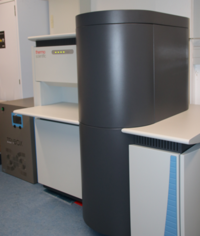DFG projects

![[Translate to English:] DFG](/fileadmin/_processed_/1/4/csm_dfg-logo-teaser_e8fbfc8af0.jpg)
GRK 2901: Systemic and local reactions in case of incompatibility to biomaterials for joint and skin lesions (SYLOBIO)
Term: since 2024
The Research Training Group GRK 2901/1 SYLOBIO, funded by the German Research Foundation (DFG), investigates both the local and the systemic reaction to biomaterials. Possible incompatibilities of biomaterials used for joint replacement and dressings for chronic wounds are triggered by inflammatory reactions in the host tissue, which are characterized by cell type-specific intracellular and extracellular signalling pathways. These can lead to chronic foreign body reactions. In addition, degradation products from the biomaterials can further intensify the foreign body reactions. The central research question addresses the systemic response to biomaterials by biological factors from the environment of the biomaterial as well as the systemic exposure to degradation products that can lead to inflammation in organs and tissues distant from the biomaterial. In order to capture the complexity of material-induced inflammation and the patient-specific diversity of tissue response, a multidisciplinary approach is taken to analyze the systemic and local mechanisms of action in detail.
DFG Large research equipment: X-ray photoelectron spectrometer (XPS)

Acquisition: August 2021
Project leader: Prof. Dr.-Ing. Niels Grabow
With the XPS it is possible to perform layer analyses in the nanometer depth range. The analysis provides quantitative information on the element dispersion and can also provide information on the type of bonding or the oxidation status of metals or polymers. In addition to point and image analyses, depth profiles for the analysis of more complex layer configurations are also possible, whereby the individual layers are ablated by ion bombardment.
The method is suitable for the analysis of corrosion on surfaces, surface modification and loading, material degradation, determination of the layer in which lamination occurs and also for the analysis of diffusion effects between two layers, especially for very thin layers.
The project is conducted in collaboration with the Chair of Materials Science and the Department of Technical and Analytical Chemistry of the University of Rostock, as well as together with the Department of Orthopaedics/Biomechanics and Implant Technology Research Laboratory and the Institute of Toxicology and Pharmacology of the University Medical Center Rostock.
3D-printed Drug-Delivery-Systems with controllable drug release
Running time: 2017 - 2019
Project chair: Dr. Michael Teske
Goal of the project is the development of a Drug-Delivery-System with a controllable drug release. The DDS should make an implant based, local release of drugs and drug combinations with predetermined mechanisms possible. The production of the DDS requires a new 3D-printing process, which will combine the microstereolithography and the inkjet-technology. With this new procedure it will be possible to generate the base structure with microstereolithography and simultaneously place a drug/crosslinker mixture in specified depots with the inkjet-modules. Because of the separation it will be possible to variate the characteristics (like drug concentration) within the DDS. This leads to a controllable and predictable release of incorporated drugs.
The project is processed in cooperation with the Chair of Microfluidics of Rostock University.

![[Translate to English:] DFG-Logo](/fileadmin/_processed_/1/4/csm_dfg-logo-teaser_fa362797a1.jpg)